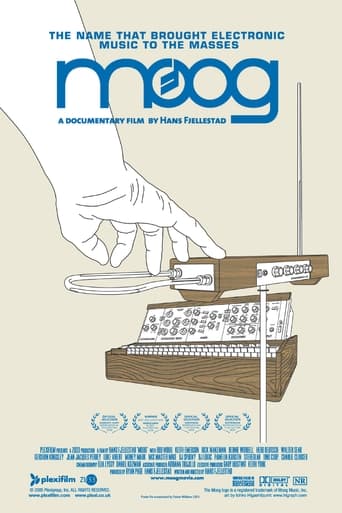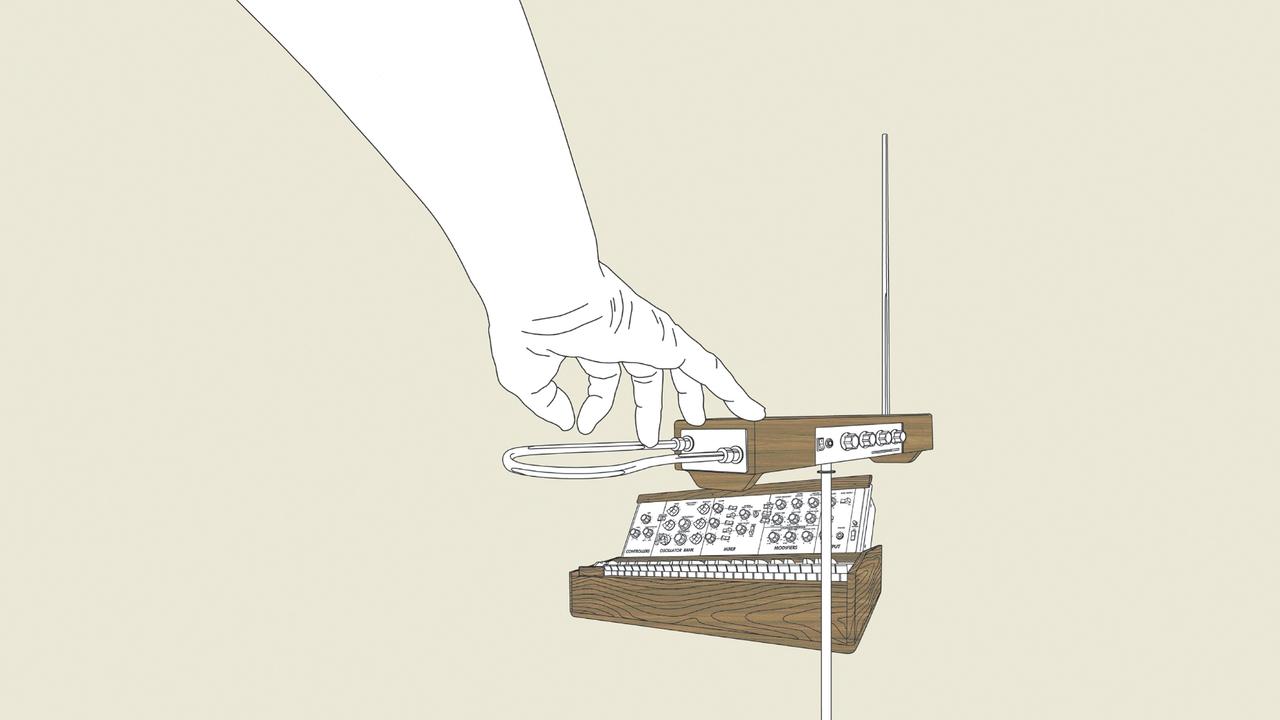LCShackley
I was captivated by Moog synthesizers at age 12, when "Switched On Bach" was released. I've read many things by and about Bob Moog over the years, and was looking forward to seeing this documentary. But sadly, it's a missed opportunity. First of all, the video quality looks like an 8mm home movie from the 1970s, rather than a 2004 production. Secondly, it's very amateurishly done. For instance, when you have Bernie Worrell, Rick Wakeman, and Moog together to talk about synths, do you think you could possibly pull them into a quiet room, instead of holding a 10-minute interview in a busy hallway with so much background noise that the voices are hardly audible? There are interesting bits here, including archive footage of the Moog assembly line and Gershon "Popcorn" Kingsley with his Moog Quartet. But there's a lot of BAD synth music too, and poor visuals. If you're a die-hard Moog fan like myself, you'll put up with it. If you're not, skip it.
drmidi
I must say that this documentary is a rather poor tribute both to Robert Moog and the Moog synthesizer for a myriad of reasons. Perhaps you might watch this (as it is being aired this month, December, 2007 on The Movie Channel (HD) for the same reason that I did (and that is to see what this documentary had to say about the man and his instrument, philosophy and some of the history behind the Moog synthesizer's and company's development), however the total impact of this piece greatly suffers both from what was included in the film and what was left out.Granted, it is obvious that this film was not intended to be a complete historical review of the Moog's development. The same applies to the music, musicians, interviews and other footage including Robert Moog's own comments about himself, his instrument, and those who used the instrument commercially or in performance. The soundtrack is also quite disappointing, especially in terms of what was chosen as representative examples of Moog performances over the years. I suppose you would have to be well-versed in the history of the synthesizer (as I am) to fully understand this.I agree with other reviewers in that Walter/Wendy Carlos was only briefly mentioned during this documentary, especially when it applies to the Moog modular system (as recorded on Switched-On Bach, The Well-Tempered Synthesizer, Switched-On Brandenburgs, Tron and others) which were perhaps the first and most influential recordings of the Moog synthesizer of all time. Also missing were such artists as: Isao Tomita, Dick Hyman, Herbie Hancock, Tony Banks (Genesis), and many more who recorded and performed with the Moog synthesizer during its early years. Instead, the focus of the piece centered around Keith Emerson, Rick Wakeman, Bernie Worrell and some of the early partners and friends who worked with Moog towards its development (Herbert Deutsch and other contemporaries and personal friends of the late Dr. Moog). The interview with Wakeman and Worrell was taped in a noisy hallway and could have been more effective (at the very least) by being taped in a quieter setting.The commercial use of the Moog synthesizer centered around a rather dated beer commercial. I was expecting perhaps an interview with Suzanne A. Ciani who was infinitely more prominent in this area. In other cases, the interview location (city) was titled, but not the name of the person speaking with Bob Moog and that was also disappointing.I also agree that certain comments were repeated, especially Bob's comment on having a feel of what was going on within the Moog's circuitry when he played it. Since he also discussed the Theremin (which seemed to be a major portion of this documentary) it would have nice to included some commentary about Miklos Rozsa and the role the Theremin played as the only recognized synthesizer as an "orchestral instrument." I am referring to many film score recordings which featured the Theremin, such as Hitchcock's Spellbound and many others in the suspense and Sci-Fi genres. There was little discussion about the other Moog synthesizer models outside of the modular system and the MiniMoog (such as the PolyMoog, MemoryMoog, and others).The in-between footage, music and performances were rather disappointing and disjointed. I think the director could have planned a better tribute to a wonderful person, inventor, instrument, social and historically-significant musical technology. I think to really do justice to both the man and his machine, you would have to present, at the very least, about a 2 to 3-hour-long documentary.On the plus side, it was interesting to see the Moog in production and some of the performance and interview footage, but not all. Actually, much of the footage is somewhat comical in nature when you look back at how it was presented, back in the early days of synthesis.
jonathan-577
This is the kind of movie that makes this exercise of writing up every feature I see kind of redundant, because it's not much of a movie. (at 60 minutes it's not much of a feature either) Bob Moog invented, you know, the Moog synthesizer, which as the movie illustrates has been the source of lots of directions in music, some legendary (Bernie Worrell), lots fun (Stereolab), and lots of atrocities against the ear (Rick Wakeman, Keith Emerson). The common thread between these musicians is nonexistent, and the movie doesn't even try - it just plods from point to point, with Bob in tow to look on like a proud papa. I think the reason there's no cross-cutting is that there's no content - some lawyer clearly wouldn't let them talk about Moog's battles with the company that bears his name (don't ask me for more detail), and all that's left is a sequence of short arbitrary rambles - still life with Gershon Kingsley, still life with DJ Spooky (who is a pompous ass), Moog picking bell peppers, et cetera, plus some wan recitations of the word 'spirituality.' The only breakout moment is when Worrell tells Wakeman that he thinks of a keyboard as a woman that he's having sex with and Wakeman responds, 'I tried that but I found that the songs became very short.' To which Worrell replies, 'Play slower!' THERE is a cultural frisson to die for.
piechart2000
I enjoyed watching this homage to the synthesizer inventor and all round nice guy Bob Moog but spent hours afterward discussing ways this documentary could have been better. That's not to say there's all that much wrong with it except that it suffers from a genuine lack of archive footage. Bob was building his Synths from the early 60s, before that he was making Theremins. There's no footage of any of this. 'Why not use stills and rostrum?' was my immediate thought.It was great to hear Moog Synths being played well. Rick Wakemen (who provides the film's one big laugh) made them sound good. In fact, just to hear people messing about on them was interesting. I wanted more of this and perhaps some insights into how they were used in the studio (the film concentrates mainly on live performance).Perhaps just a bit too much time was spent allowing Bob to share his rather vague (and, sorry to say this, slightly boring) view of the universe. Not that the Doc as a whole is boring, it is not. It is very watchable and only 70 minutes long. Though I wanted something more from it, it did do what it set out to do without sagging.


 AD
AD



